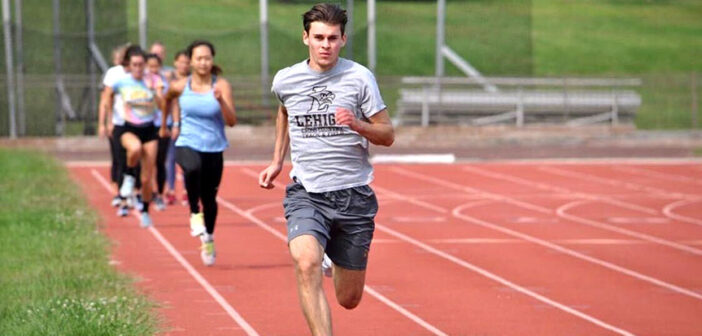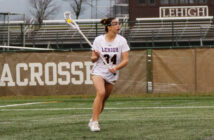When Evan El-Halawani first heard about a rise in coronavirus cases at Lehigh in late September, which followed the discontinuation of the original mandatory weekly surveillance testing, he said he was genuinely scared and couldn’t imagine a scenario where cases wouldn’t spiral due to the lack of testing on campus.
Since Sept. 28, Lehigh has reported 246 cases of COVID-19 among students in Bethlehem compared to just around 10 the first month of the semester. In response, Lehigh increased the amount of surveillance testing and included fully remote students in its testing protocol.
El-Halawani, who is a senior hurdler and sprinter for the men’s track and field team, said if the school had provided more regular weekly tests during that time period, Lehigh’s athletic teams, which haven’t held practices since Sept. 29, would probably still be practicing and would thus have a better outlook for competition in the spring.
El-Halawani said with more frequent testing throughout the semester, fewer students would’ve gotten sick, fewer would’ve had to stress about quarantining and fewer families would have had to worry about their kids being at school.
Lehigh’s coronavirus outbreak in late September initially forced the athletic shut down. Over a month later, as Lehigh has started to ease back the use of campus facilities such as the libraries, Taylor Gym and outdoor spaces for off-campus students due to a decline in the coronavirus positivity rate, team practices and use of athletic facilities remain suspended.
For many Lehigh athletes, the lack of testing, which El-Halawani said was a failure of the school, has been frustrating. Even still, El-Halawani and other athletes said, aside from testing more, they are not sure what else Lehigh’s administration could have done this semester to help facilitate athletic involvement. Ultimately, several athletes feel Lehigh’s administration has had athletes’ best interests in mind when making decisions regarding athletics.
Unlike Lehigh, which was able to have organized practice for three weeks thus far this semester, some colleges had completely shut down their athletic programs this fall from the start.
But the inconsistency is striking. Other schools and leagues, meanwhile, have had athletic competition with fans in attendance. With such a wide disparity in how athletics are being handled across the country, senior women’s soccer goalkeeper and track and field runner Miranda Royds said it can be difficult to know what the best decision is for a university regarding athletics.
Royds said when there are games on the line, it may be easier to enforce COVID protocols. She said bigger conferences and schools are able to test more frequently, helping mitigate potential outbreaks among athletes. Royds said she has friends at Duke University who partake in athletics that receive tests three times a week.
“I think having games and everything kind of puts more of a real factor to it and makes everything kind of more strict with guidelines and having all teams follow the right protocols, because you do have more on the line whereas we only have practice right now,” Royds said. “Do I know if Lehigh could’ve gotten it to work? Maybe not, but I think at the Patriot League level I wished that there was more getting everyone back to play. But I think it’s kind of a double-edged sword.”
Women’s basketball senior guard Mary Clougherty said, while she would’ve liked to have athletic competition at Lehigh this fall, she understands it may have been tough for Lehigh to implement athletic protocols that some larger schools and conferences were able to execute.
Clougherty said the lack of tests, compounded with unsafe behavior from students, may have contributed to the outbreak.
“I feel like it would’ve been effective to start that surveillance testing weeks earlier than they did,” Clougherty said. “My personal take on the college body is that if we know we’re not getting tested, I’m not saying this was ever my behavior, but there are many people that will not necessarily actively participate in protocols unless they know there may be a consequence.”
El-Halawani said in the spring, even if Lehigh allows competitions, athletes should be allowed to choose if they want to compete and should not be forced into something they’re not comfortable with.
El-Halawani said although he misses track right now, he is OK with not competing this semester and feels that Lehigh’s decision to limit athletic involvement right now is the right one.
“I think a lot of student-athletes may need to really do some soul searching and recognize that sports isn’t an end-all in everyone’s case and sometimes we really have to come together as a collective and put our individual needs aside to recognize that there’s something greater going on,” El-Halawani said.
El-Halawani said he feels nation-wide, the disparity in how the coronavirus pandemic is being handled among athletics has been hampered and exacerbated by President Donald Trump’s administration. As cases spike nationwide, El-Halawani said Trump’s push to have athletics, especially college football, create a clouded picture of what actions universities should take regarding athletics.
Right now, El-Halawani said, erring on the side of caution is important given the severity of the pandemic.
“I think from the upper administrative level, it became hard for universities to interpret how they should be acting toward the coronavirus, so I think from Lehigh all the way up to larger schools, it became this question of making a choice that kind of went against that of what even the president of the United States would’ve suggested was the correct action,” El-Halawani said.
For women’s soccer junior midfielder and forward Rebecca Van Siclen, while she said she respects Lehigh’s decision to limit athletic involvement this semester for the safety of athletes, she wishes Lehigh would have been able to emulate some other schools that have successfully had competition this fall.
As Lehigh approaches a decision on a potential spring season, Van Siclen said she hopes Lehigh’s administration considers all of the work student-athletes have been doing this semester, on and off the field, to prepare for a season.
Specifically citing seniors on some teams who may not be able to hold their scholarships past this academic year, Van Siclen hopes for their sake there will be a spring season.
“I do think that maybe athletics wasn’t the complete priority of our school this semester, which, at times I can understand, but other times it definitely makes me wonder a little bit because we do have seniors that lost their senior year, captains that were named and weren’t able to captain their senior team,” Van Siclen said.
While Van Siclen, El-Halawani, Royds, and Clougherty still have hope for a spring season, Clougherty said there is some concern that not being able to practice much as a team this fall could impact the feasibility of a spring season.
The men’s and women’s basketball seasons are tentatively supposed to start an in-conference schedule this January, Clougherty said, but with the way things are going right now, she said that start date could be difficult to achieve.
“What we’ve seen so far isn’t great in terms of having high hopes for games in winter and spring, but at the same time, there’s still time for that to develop,” Clougherty said. “I’m not being too discouraged and have a lot of faith in our administrators and deans to try to get it going.”
Regardless of what a spring season may look like, Clougherty, Van Siclen, El-Halawani and Royds all agree that more frequent testing is needed to sustain athletic involvement.
“We’ll definitely have a (spring season) if our testing is increased, we’re going to need to have funds for an increase in testing, but besides that, I think if we get the testing, we’ll play, and I think if we don’t get the testing, we’ll kind of phase into it again and see where things go,” Van Siclen said.






Comment policy
Comments posted to The Brown and White website are reviewed by a moderator before being approved. Incendiary speech or harassing language, including comments targeted at individuals, may be deemed unacceptable and not published. Spam and other soliciting will also be declined.
The Brown and White also reserves the right to not publish entirely anonymous comments.